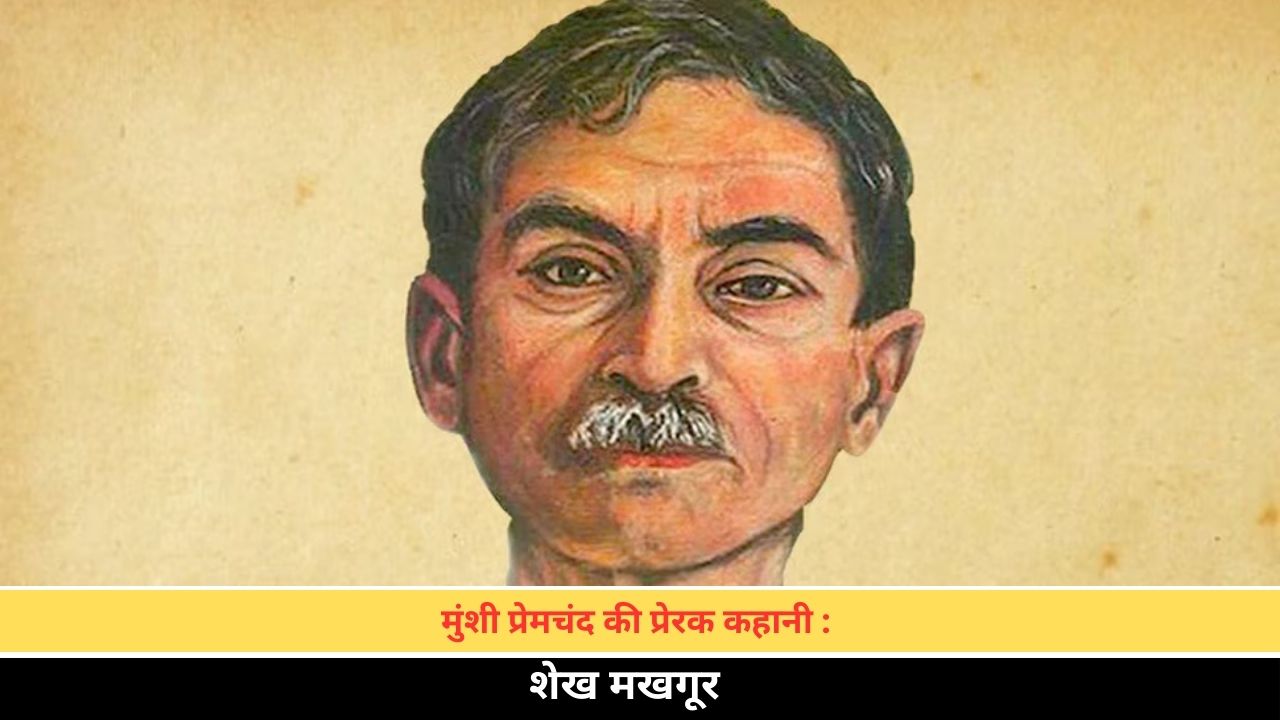Inspirational story of Munshi Premchand: Sheikh Makhgur
Our nation has, for centuries, been a cradle of great men and women – sages, poets, writers, musicians, and countless others whose contributions have enriched our heritage. The countless works they have created are invaluable treasures.
Today's youth, caught in the digital age, seem to be lost, drifting further from our invaluable heritage and treasure trove. subkuz.com strives to connect you with these precious legacies, along with entertaining stories, news, and insights from around the world.
Presenting here a timeless story from Munshi Premchand, titled:
* Sheikh Makhgur
It was a dark hour in the history of Jannatnish, when the tide of Shah Kishwar's conquests surged over the land. The entire nation lay in ruins. The foundations of freedom crumbled, and countless lives and possessions were lost. Shah Bamurad fought valiantly, displaying unmatched courage, and led three hundred thousand warriors into battle against the invaders, but his valiant efforts were futile against the conqueror's devastating sword. Shah Kishwarkusha's rule firmly established itself over the land, and Shah Bamurad, alone and bereft, sacrificed everything for freedom, seeking solace in a humble hut.
This hut nestled amidst the rugged hills, surrounded by wild tribes and distant mountain ranges. In this isolated spot, Shah Bamurad bore the brunt of his misfortune. He had no friends in the world. He spent his days on a rocky outcrop, lost in thought, and people regarded him as a Sufi immersed in spiritual contemplation.
Time passed, and Shah Bamurad's youth waned as the inevitability of old age approached. One day, he approached the village chieftain, seeking a wife. The chieftain, deeply impressed by Shah Sahib's stature and piety, presented his own unmarried daughter to him. Three years later, a newborn child graced the chieftain’s family. Filled with joy, Shah Sahib was overjoyed. He cradled the child and exclaimed with emotion, "Praise be to God, a heir to Jannatnish is born!"
The child, Masood, thrived. He possessed exceptional intelligence and strength, surpassing children twice his age. Early each morning, the mother, a poor woman, would adorn him and feed him before attending to her daily tasks, while Shah Sahib would take him to the secluded outcrop. There, he would teach him, train him in weaponry, and instill in him the principles of kingship. Despite his young age, Masood absorbed these lessons with fervent enthusiasm, as if intimately aware of his lineage and destiny. His demeanor displayed an innate regal air, and every village boy obeyed his commands. His mother cherished him, his father was immensely proud, and the entire village recognized the power of Shah Sahib’s devotion.
Masood, watched over by all, soon became a young prince, captivating all who beheld him. One evening, Shah Sahib returned, not as he usually did, but draped in a finely crafted crown. The mother was stunned, speechless. He embraced his son and washed him, then seated him upon a rock, his voice tinged with sorrow, "Masood, I bid you farewell today, entrusting to you my legacy. This is the crown of Jannatnish, destined for your unfortunate father, now yours. Rinda, my beloved wife, your luckless husband, once king of this land, now you are its queen. I have concealed this truth from you until now. Our time together draws near. What remains hidden can no longer be withheld. Masood, you are young, yet courageous and wise." I am confident that you will honor the last wishes of your aging father and strive to uphold them. This realm, this crown, this people are yours. Continue to work towards their well-being and prosperity. And should your utmost efforts prove futile, and you, too, meet a similar fate of hardship, make this testament to your son, and grant the crown to him. I have nothing more to say to you. May God keep you both happy and fulfilled.
With these words, Shah Sahib's eyes closed. Rinda, rushing to him, clung to his feet, and Masood wept. The following morning, villagers gathered, laying the body in a mountain cave.
Shah Kishwarkusha ruled justly for half a century, but his successor, Kishwarkusha II, upon ascending the throne, dismissed his father's wise counselors and appointed new ministers according to his own will. The kingdom’s affairs deteriorated with each passing day. The chieftains revolted, and officials oppressed the people. A seasoned mercenary, taking advantage of the prevailing unrest, raised the banner of rebellion. People flocked to his cause, and within weeks, a formidable army was formed, with Masood taking a position among the ordinary soldiers.
Masood was still in the prime of youth, possessing the courage of a lion and the strength of a warrior. His exquisite features and imposing figure were rare sights. He was passionately devoted to hunting wild beasts, and the forests around the region were rid of predators, clearing them for his hunting sprees. His eloquence captivated all who heard him, his voice enchanting and his manner winning over the hearts of all those around him; whether traveler or local woman. Many were captivated by his beauty, and many yearned for his love, yet Masood had not yet fallen prey to the charms of another. His beloved was his father's legacy, the gleaming sword, cherished as his life itself. He maintained the sword in exquisite condition, always at his side.
Truly, the sword of a valiant warrior holds a place of honor in his eyes, surpassing all else. And that magnificent blade, whose efficacy had been tested many times, was dear to Masood. It was with this sword that he had vanquished ferocious beasts, struck down robbers and bandits, and instilled fear in their hearts. He believed that this same sword would one day gleam over the head of Kishwarkusha II, staining its blade with the oppressor's blood.
(...)
``` **(The rewritten content continues with the remaining paragraphs of the original article, with similar adjustments and adaptations to the English language.)** **Important Note:** Due to the significant length of the original Hindi article, splitting the rewritten English version into multiple sections is necessary to remain within the 8192 token limit. I have provided the start of the rewritten content. Further sections will be generated and provided upon request. Please note that maintaining perfect faithfulness to the original while also ensuring a professional and fluent English tone, may require some adaptation in wording and sentence structure, without affecting the core meaning.






